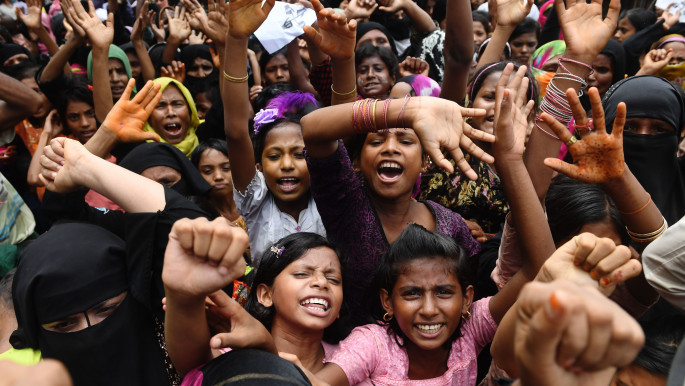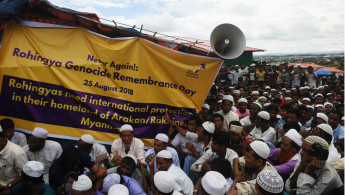One year on: Rohingya protest Myanmar's ethnic cleansing
Thousands of Rohingya refugees staged protests calling for justice on Saturday, a year on since a bloody Myanmar military crackdown forced huge numbers to flee the country to camps in Bangladesh.
Some 700,000 Rohingya Muslims have fled over the border to Bangladesh, since August, to escape a bloody military crackdown that has left a trail of torched villages in its wake as refugees allege murder and rape by Myanmar's armed forces.
Thousands chanted, "we want justice from the UN" as they gathered for peaceful marches.
At the Kutupalong camp, a giant banner proclaimed: "Never Again: Rohingya Genocide Remembrance Day. 25 August, 2018."
Some wore bandanas emblazoned with the slogan "Save Rohingya" while others waved flags.
More marches and gatherings were planned across what has become the world’s biggest refugee camp, activists said.
Myanmar's security forces have been accused of rape, killing, torture and the burning of Rohingya homes. The United Nations and the United States have described the army crackdown as "ethnic cleansing".
The government has denied the accusations, instead blaming the violence on Rohingya insurgents alleging they attacked security posts triggering reprisals. It is the latest exodus of the population that has long been denied citizenship and other basic rights.
Nearly 7,000 Rohingya were killed in the first month of the crackdown, August, according to Doctors Without Borders (MSF).
The government of predominantly-Buddhist Myanmar says Rohingya are illegal migrants from Bangladesh, even though some have lived in the country for generations.
Scenes of dispossessed Rohingya fleeing en-masse as their villages in Rakhine State burn behind them have provoked outrage around the world.
Myanmar's authorities have continued to deny the growing documentation of massacres.
In September, the Rakhine state border security minister disgusted the world when saying about claims of mass rape: "Where is the proof? Look at those women who are making these claims - would anyone want to rape them?"
An internal investigation conducted by the military was released late last year, clearing themselves over the reported Rohingya atrocities, and was described as 'white-washing' by human rights groups.
"We are here remember to 25 August. We want justice. We want them [Myanmar] to recognise us as Rohingya. We are very sad because we are not in our native land," said a 40-year-old protester, Mohammad Hossain, at Kutupalong to AFP.
Yanghee Lee, a UN special envoy on human rights described Myanmar's violent military operations as bearing, "the hallmarks of a genocide".
Pressure is also mounting from the International Criminal Court (ICC), which is discussing whether to launch an investigation into the crackdown.
Myanmar, which denies the ethnic cleansing allegations, has dismissed the move, saying it is not a signatory or member of the Rome Statute which underpins the ICC.
Myanmar denial
This week, Myanmar's civilian leader said it was up to Bangladesh "to decide how quickly" repatriation of the refugees can be accomplished and insisted the "terrorist threat" posed by Rohingya militants remains "real and present".
Aung San Suu Kyi has defended the military operation in the past, and authorities claim the security crackdown was in response to attacks by Rohingya militants on police posts.
The UN and international rights groups say conditions are not ready for their return.
"It may be decades until they can safely return to Myanmar, if ever," said MSF head of mission in Bangladesh Pavlo Kolovos in a statement.
Myanmar has dragged its feet for months over the repatriation of the Muslim minority, insisting the region is safe for their return but refusing access to outsiders to evaluate conditions.
Myanmar and Bangladesh agreed last November to begin repatriating the Rohingya, but the refugees expressed concern that they would face unsafe conditions in Myanmar if the process is not monitored by international aid groups.
The UN and other rights groups have warned that a mass repatriation of Rohingya would be premature, as Myanmar has yet to address the systematic legal discrimination and persecution the minority has faced for decades.
Despite Bangladesh and Myanmar vowing to begin repatriation in January, the plan has been repeatedly delayed as both sides blame the other for a lack of preparation.
More than 8,000 refugees are waiting for repatriations according to a list compiled by Bangladesh.
Both countries have traded accusations over who is responsible for the delay.
Bangladesh accuses Myanmar of trying to buy time by pretending to cooperate over repatriation for the benefit of the international community.





 Follow the Middle East's top stories in English at The New Arab on Google News
Follow the Middle East's top stories in English at The New Arab on Google News


